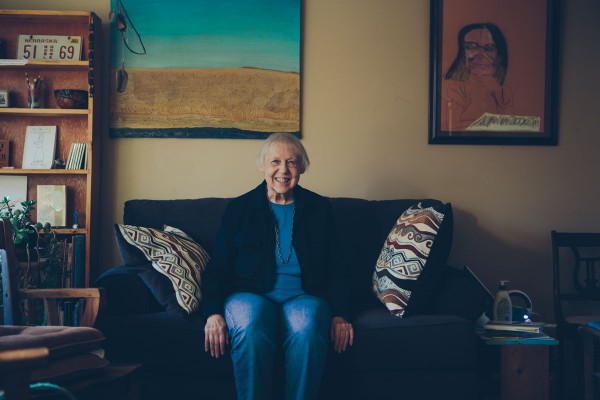Article originally published in The Encounter May/June 2015 edition.
Somewhere along the continuum of every poem and scrap of prose that ever was and ever will be, Marilyn Coffey’s canon hovers quietly like a fleck of dust swept from the spine of a leather-bound classic.
She was never in it for the fame anyway.
“It’s going to be a very tiny part,” Coffey, 77, says of her contribution to the whole of literary history while holding her thumb and index finger an atom’s width apart, “even if it’s a huge part to me at the end of my life.”
But for those loyal readers of the national prize-winning and internationally published author known for her brazenness and ability to reconcile casual, everyday language with contextually strange words, Coffey will be remembered as a revolutionary. She’ll be remembered as a second-wave feminist who fought for sexual freedom, one lover at a time.
“Any woman who loves/one man and only one man/is mad (or sane),” wrote Coffey in her 1960s poem, “Credo”. “I see it this way: why love one when you can love two/or three or more.”
Coffey was probably damned to put up a fight from the beginning, she says. It’s easy to see why. The author says she was raised in the middle; the middle of nowhere in the middle of the United States in the middle of last century, with an undiagnosed case of bipolar disorder and a lot of sexual feelings that she didn’t know what to do with.
“I masturbated a lot and then I found out I wasn’t supposed to,” Coffey admits while laughing off a slight embarrassment for her puritan generation. “I got involved with this Christian youth leader…and that didn’t go well. I actually did try to kill myself at that point in time.”
After religion failed to exorcise her lust, she says, Coffey denounced her faith and eventually left the comforts of her home state. She found inspiration in a brand new novel called On the Road by a then relatively unknown Jack Kerouac.
“And then I left and I went on the road,” she says, pausing as if she still doesn’t believe it to this day. “I went on the road…I went on the road and it was definitely an experience, not like his [Kerouac’s], but it was like mine—it was an experience I wouldn’t have had otherwise if I hadn’t read On the Road.”
Her trip lasted about a year before she landed in New York for roughly the next 30 years. It was in Greenwich Village where Coffey started her discourse on female masturbation through her adolescent heroine, Marcella, and where she won the Pushcart Prize for “Pricksong,” a poem described by the Los Angeles Times as “a wry poem about an obscene houseplant.”
“I was so delighted that it was that poem that was recognized,” Coffey says, weighing the award’s fatalistic importance, “because had it been one of my more conventional poems, I would’ve felt the push to behave like you’re supposed to.”












